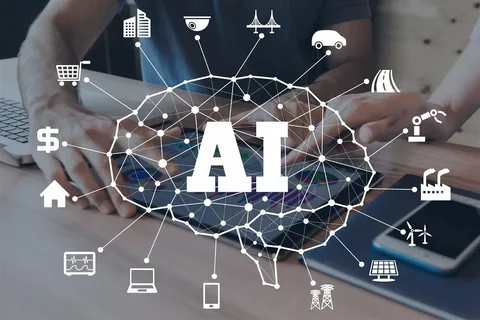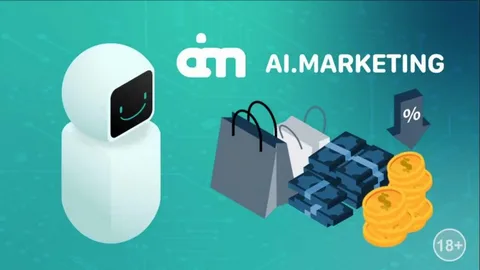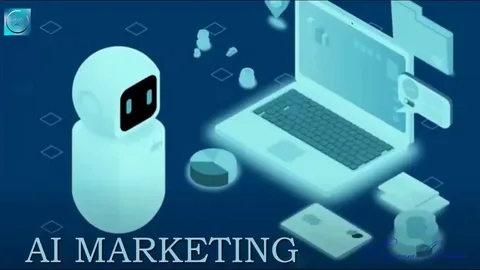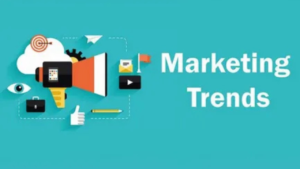Introduction of AI in marketing:
The world of marketing has been going through a sea change for the last couple of decades or so, and Artificial Intelligence, more popularly known as AI, has been its backbone. AI in marketing is fast changing the landscape to enable businesses to offer better customer experiences, optimize their campaigns, and drive sales. Precisely, what is AI in marketing, and what does that shape up as in the future? This comprehensive guide will walk you through what exactly AI marketing consists of, the tools and strategies being put into play, and the trends pushing this technology up the food chain to make it top dog in digital marketing.

Artificial intelligence AI in marketing is no longer a passing trend, but it has grown into the substantial basis on which businesses can grow and advance to stay competitive. AI in marketing encompasses a broad array of technologies and methodologies devised for the purpose of analyzing vast data sets, predicting consumer behavior, and automating marketing tasks-all in the interest of enriching the customer experience.
From personalized content recommendations to predictive analytics, AI in marketing tools will upend the way brands interact with their audiences. With consumers demanding an increasingly personalized experience and on-point timing, businesses are readjusting their approaches to meet these demands by maximizing their use of AI. This thorough guide explains what the core of AI in marketing, benefits, strategies, and tools that will shape the future of this dynamic field. Be it a seasoned marketer or a fresh-started one, none of you will be able to keep up with this evolving marketing landscape without knowing the role that AI plays. From exploring innovative AI marketing worlds to going through ways that can make your marketing efforts truly take off.
Table of Contents
What is AI in Marketing?
AI in marketing revolves around leveraging artificial intelligence technologies to automate data analysis and predict consumer behavior with the aim of further optimizing marketing strategies. AI in marketing tools are thus designed to enhance efficiency, ensure better customer targeting, and offer truly personalized experiences. Machine learning algorithms, NLP, and analytics-ALL allow AI to make sense out of big datasets, discover their patterns, and extract actionable insights from them.
The applications of AI in marketing cut across content creation, customer service, predictive analytics, and automation of tasks that associate with AI in marketing . In that direction, AI digital marketing will hence enable marketers to take informed and data-driven decisions, optimize campaign performance, and reduce efforts manually.
The Role of Data in AI Marketing
Data sits at the very core of AI in marketing. The more data it gets, the better the job it does, and AI only gets better with more data. AI in marketing basically deals with the aggregation, analysis, and usage of information to make wiser decisions. The large volumes of information from customer interactions, social media traffic, website traffic, and purchasing behavior are harnessed by AI in marketing tools, thus enabling them to predict what future trends may look like and how to understand customer preferences and fine-tune marketing strategies in light of the same.

These can analyze data with the intent to predict, for example, where a customer is most likely to buy something. From there, businesses may send personalized offers or promotions that increase the likelihood of that customer turning into a conversion.
Some Key AI Marketing Tools
There can be many types of AI in marketing tools, but each is targeted to carry out certain functions. Here are some of the most common AI marketing tools deployed in the industry today:
- AI-Powered Chatbots
The chatbots are one of the hot artificial intelligence tools applied Ai in marketing. These AI-driven virtual assistants can understand customers, answer questions, solve problems of customers, and also help guide customers through their purchase decision journey. This all is possible because of NLP-a facility given to chatbots to understand queries by customers and respond accordingly in a manner quite similar to human beings. - Predictive Analytics Tools
Predictive analytics are probably the most powerful AI tools in marketing, using history to come up with forecasts on the future behavior of customers. From analyzing past purchases and browsing history to social media interactions, these tools use various kinds of data to predict trends and customer preferences with a bias toward buying intent. With this information, marketers have the ability to create focused campaigns that truly resonate with audiences. - Content Creation Tools
AI in Marketing also spans the gamut of content creation. Much like Automation Anywhere, other tools, such as Copy.ai and Jasper, leverage the power of machine learning to output high-quality content in minutes. These tools learn from data what kind of content resonated with what audience and build blog posts, social media posts, and even ad copy based on this insight. - AI-Powered Advertising
Meanwhile, AI in marketing tools are equally unstoppable in their wave of digital advertising. From Google down to Facebook, AI helps optimize ad targeting so that ads actually reach the most relevant audience. AI algorithms study user behavior, demographics, and interests, delivering personalized ads much more likely to convert. - Customer Segmentation Tools
Customer segmentation plays a very significant role in digital marketing. AI makes the task of segmenting customers, according to their behavior and preference, much easier. Since AI marketing tools analyze millions of data sets before segmenting customers into groups, that is why marketers can target each segment with customized campaigns. - Voice Search Optimization Tools
With the proliferation of voice-activated devices such as Amazon Alexa and Google Assistant, voice search optimization could very well be one of the major trends in AI marketing. AI-driven tools will enable businesses to optimize their content for voice search so that their products or services also show up in voice searches.
Future of AI Marketing
AI in marketing is not some passing fad; rather, it is a natural stage of evolution for marketing. The more data businesses continue to get from customers, the more crucially important AI will become in deciphering and transforming that into actionable insights. For example, the industry of marketing has evolved from traditional modes of advertisements to digital marketing and now into AI-powered marketing strategies.

Rise of Personalization
Perhaps the biggest advantage of AI in marketing can be accounted for as the power of personalization that AI serves up. This has quickly risen to the top of a marketer’s to-do list, while buyers want brands to talk to their specific needs. AI in marketing driven personalization is about allowing businesses to create an experience that caters to the needs of each customer-be it personalized product recommendations, customized email content, or targeted ads.
Automating Repetitive Tasks
AI in marketing tools save time because they automate many tasks that would otherwise be mundane. From automated email marketing to social media scheduling, AI does what takes hours of manual labor. This has made it quite easy for any marketer to keep their businesses at high momentum, as they put more concentration on strategic initiatives, such as creating campaigns or improving customer experiences.
Optimizing Campaigns
AI in marketing tools make real-time optimization of marketing campaigns a reality. An AI system will analyze the performance of a campaign and make automatic adjustments with the view to optimize the efficiency of that campaign. For instance, it will optimize ad spend, targeting, and creative to ensure the campaigns drive the highest ROI.
AI in Influencer Marketing
Influencer AI in marketing has grown very organically over the past couple of years, and AI is integral to the space. AI tools can sort through social media data to find the most relevant influencers for a brand’s target audience. Other ways AI can be used are tracking performances through the influencer campaigns in the form of engagement rates and reach and return on investment.
AI Marketing Strategies for 2024 and Beyond
AI in marketing keeps on evolving, and businesses desirous of staying ahead of the competitive fray have no choice but to move ahead with up-to-date AI marketing strategies. Hereafter are some of the most considered artificial intelligence marketing trends that will be in focus in 2024 and beyond:

- Hyper-Personalization
Where traditional personalization does end, hyper-personalization picks up since it enables AI analysis in real time and thus super-targeted content, products, and services. This means that companies using hyper-personalization can offer customers frictionless experiences throughout their journeys-from email marketing through social media touchpoints.
- AI-Driven Video Marketing
Video marketing continues to be one of the most effective ways of audience engagement, and AI is opening up new paths even in that direction. For example, AI-driven video marketing tools analyze customer data and create customized video content for each viewer. Besides, AI can analyze video performance metrics to further optimize the video marketing campaigns. - AI and Predictive Customer Insights
AI in marketing is gradually moving towards predictive customer insights. Through data analysis derived from various sources, AI will allow businesses to gain deep insight into customer behaviors and preferences. In that way, businesses are likely to anticipate the needs of customers and provide a personalized solution even before customers may request the same. - AI-Powered Marketing Analytics
With heightened power, the sophistication of AI in marketing analytics tools aids companies in effectively measuring the effectiveness of their marketing campaigns. Customer-interaction-tracking AI analytics tools analyze the data through various touchpoints and draw meaningful insights from them. These will tell marketers what is working and what is not, hence truly enabling them to make decisions based on facts. - AI in Social Media Marketing
Social media marketing is one of the most fast-evolving spaces, and AI started contributing quite prominently to this evolution. These days, it’s not an issue anymore; on the contrary, AI tools start analyzing social media trends, finding relevant influencers, and optimizing social media content. In the years to come, AI-powered social media marketing tools will be even more advanced, making it possible for businesses to run highly targeted social media campaigns that drive engagement and conversions.
AI Benefits in Marketing
The benefits of AI in marketing are unlimited, and the businesses that are open to adopting the idea of AI in marketing tools realize major improvements in their marketing performance. Here are some key benefits of AI in marketing:

- Improved Customer Experience
AI will, therefore, let organizations personalize experiences for their customers to improve their satisfaction and loyalty. Be it personalized product recommendations or customized email campaigns, AI simply helps businesses reach out to their customers at a more personal level. - Efficiency
AI in marketing tools automate cumbersome tasks for marketers and let them devote time to more strategic initiatives. This not only brings more efficiency but also ensures better outcomes. - Data-Driven Insights
AI in marketing tools unlock the power for businesses by driving actionable insights arising from data analysis. It aids marketers in making informed, intelligent decisions that will enable them to optimize their campaigns and improve their performance. - Better Return on Investment
AI in marketing tools help businesses in maximizing return on investment by optimizing real-time campaigns. This way, a business will have increased efficiency in budget allocation for its marketing through AI-driven decisions. - Competitive Advantage
This gives an edge to businesses using the strategies of AI in marketing over their competitors. These AI in marketing tools always help a business stay ahead regarding trends, deliver personalized experiences, and make data-driven decisions guaranteed to ensure success.
Conclusion: The Future of AI in Marketing
AI in marketing is no more a future aspect; rather, it has come to rewrite how businesses speak to customers and do marketing. From AI-powered chatbots to predictive analytics, AI in marketing tools drive personalization of experiences, optimization of campaigns, and driving more efficiency in results for businesses.
Such is the case where AI in marketing is ever-evolving; only those businesses that will embrace the technology it proffers will continue to outcompete others and thrive in the digital space. The underlying secret of how to make use of AI in driving marketing strategies, and stay updated regarding emerging trends and innovations.
One thing stands tall: AI in marketing are an unstoppable force in the changing face of digital marketing. But the question is, are you ready to tap into its power with your marketing?. Next Blog Post
FAQ
1. What is AI in marketing?
Artificial Intelligence in marketing are the technologies of artificial intelligence put to the task of automating processes, analyzing data, and making marketing strategies more effective. AI helps companies predict customer behaviors, craft personalized experiences, and optimize campaigns with chatbots, predictive analytics, and AI-powered content creation.
2. How does AI benefit digital marketing?
AI already helps digital marketing in automating mundane tasks, improving personalization, and giving actionable insights from analyzed data. AI in marketing is also ready to help in ad targeting optimization, predicting more accurate customer preferences, and lining up workflows in an effort to enhance efficiency and return on investment. ,
3. What are AI marketing tools?
AI in marketing tools are suites of applications that take advantage of artificial intelligence to lighten the marketer’s workload. These range from simple chatbots to engage customers to predictive analytics platforms that forecast trends. Other examples include AI-powered content generators, advertising platforms, and customer segmentation software.
4. How does AI improve customer experience in marketing?
AI will make sure that the content, product recommendations, and AI in marketing messages are personalized for the targeted audience. It gives the customers offers about relevant products they have searched for or like. They are constantly learning from customer behaviors in real-time, therefore offering seamless experiences across all customer touchpoints.
5. What is the future of AI in marketing?
The future of AI in marketing consists of hyper-personalization, optimization of voice search, and predictive insights on customers. It will continue to evolve towards becoming the lead role for creating personalized AI in marketing campaigns, efficiently optimizing ad spend, and improving customer engagement.
6. Can AI marketing be beneficial for small businesses?
Indeed, small businesses can gain immensely from AI in marketing. AI tools will let them automate better, personalize, and do data analytics to stay in the race with larger teams and bigger marketing budgets. Most AI-powered platforms offer reasonably-priced solutions for the needs of small businesses.




